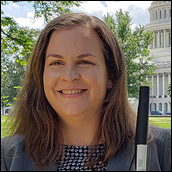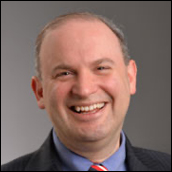With Liberty and Web Accessibility for All: Getting the DoJ’s Upcoming Rulemaking Right - Mar. 1, 2023
Early last year, more than 180 disability rights organizations wrote to the Department of Justice (DOJ) noting that “we live in a society that increasingly lives and works through digital tools and online spaces. When websites and applications are inaccessible, people with disabilities cannot apply for jobs, work efficiently, attend school, access healthcare, schedule a ride, shop, find public health information, apply for public benefits, and more.” Backed by USTPC’s own recommendations , they called on the Department’s Civil Rights Division to complete a rulemaking process (begun in 2010 but later abandoned) to formally adopt detailed regulations governing the design of accessible websites under Title II of the Americans with Disabilities Act (ADA).
For more than a quarter-century the Department of Justice has taken the position in litigation, consent decrees, and non-binding guidance that the Americans with Disabilities Act requires websites of private and public covered entities to be accessible. Yet, no regulations dictating the standards for accessible digital design have been promulgated. The DOJ’s Civil Rights Division, however, is finally poised to mandate regulatory standards for websites in a formal rulemaking slated to begin in May.
What should, and shouldn’t, these new rules look like? Can they be crafted to well serve both user and business interests? What assistive technologies (present and future) must they enable? And will new rules fully meet the needs of the one in four Americans affected by some form of disability?
ACM's US Technology Policy Committee (USTPC) hosted a HotTopics webinar session, "With Liberty and Web Accessibility for All: Getting the DOJ’s Upcoming Rulemaking Right"—now available on demand. The panel of ACM experts discussed what the new rules should look like, whether they can be crafted to well serve both user and business interests, what assistive technologies must they enable, if the new rules fully meet the needs of the one in four Americans affected by some form of disability, and how accessible websites should be designed to conform with the Americans with Disabilities Act.
Panelist Bios

Lorraine Kisselburgh (Moderator) is the immediate past Chair of ACM’s global Technology Policy Council . She is a social scientist studying the social implications of emerging technologies, including privacy, ethics, and collaboration; technological contexts of social interaction; and gender in STEM contexts. She has been awarded over $2 million in grants to support her research and teaching, including $1.1 million from the National Science Foundation, where she developed a framework to enhance ethical reasoning skills and platforms for creative collaboration. She has been recognized as a Faculty Fellow in the Center for Education and Research in Information Assurance and Security (CERIAS), the Inaugural Faculty Scholar in the Butler Center for Leadership, a Diversity Faculty Fellow, Service Learning Faculty Fellow, and the Violet Haas Award in recognition of her efforts on behalf of women. She received her MS and PhD from Purdue University, and her A.B. cum laude from the University of Southern California.
Her public policy engagement includes serving as the inaugural Chair of ACM’s Technology Policy Council , a member of ACM’s Code of Ethics Task Force, and a member of ACM’s US Technology Policy Committee since 2005 where she serves on the Accessibility, Privacy, and AI committees. She is a founding Board Member of the Center for AI and Digital Policy, Chair of the IEEE Organizational Governance of AI Standards case studies group, and Advisory Board member of the Electronic Privacy Information Center (EPIC) in Washington DC. In 2018 she was an EPIC Scholar-in-Residence where she developed the Universal Guidelines for Artificial Intelligence.
A lifelong user of assistive technology, she has been a longtime advocate for people with disabilities. She was President of a state organization to support individuals with disabilities, co-founded the Greater Lafayette Disability Coalition to lead input into the development of ADA, and has been involved in many university committees to address ADA and assistive technology needs for the campus population. As part of the USTPC Accessibility committee, she has contributed to numerous statements to Congress and federal agencies to strengthen technology accessibility.

Tim Elder is a civil rights litigator focusing on disability discrimination cases. Prior to establishing the TRE Legal Practice. In San Francisco, he was associated at Brown, Goldstein & Levy as a Disability Rights Fellow. He has helped secure injunctions against testing entities for their failure to accommodate disabled students, negotiated groundbreaking settlements with publicly traded companies, tried employment discrimination claims before juries, and argued before federal trial and appellate courts. Elder also regularly presents on the topic of disability law.
Elder holds leadership positions in the American Bar Association and the National Association of Blind Lawyers. He is also a Fellow of the American Bar Foundation. Through his civic involvement, he actively works to promote diversity within the legal profession. In 2008, he was awarded the TenBroek Fellowship for commitment to disability rights, and in 2010, he was a recipient of The Daily Record’s "VIP by 40" Award, which recognizes younger professionals in Maryland for their professional accomplishments, civic involvement, and impact of achievement.
Elder graduated magna cum laude from the University of California, Hastings College of the Law. During law school, he externed with the Hon. Marilyn Hall Patel of the US District Court for the Northern District of California. He also clerked for the Legal Aid Society Employment Law Center in San Francisco, where he worked on complex employment discrimination cases and represented low-income workers at administrative hearings.

Stephanie Enyart , the American Foundation for the Blind’s (AFB) Chief Public Policy and Research Officer, has 20 years of experience advocating for people with disabilities. After joining AFB, she launched the Public Policy and Research Institute, which conducts mixed-methods research that informs AFB’s policy advocacy. She provides strategic leadership for the policy and research functions across the key focus areas of education, employment, aging, and the intersectional issues of technology and transportation.
Prior to her tenure with AFB, Enyart worked for the Corporation for National and Community Service as the Disability & Inclusion Advisor where she provided thousands of nonprofit grantee organizations with inclusion guidance and resources. Other previous experience includes advocating for the disability community as a Skadden Foundation Fellow for Disability Rights Advocates in Berkeley, CA, and the Judge David L. Bazelon Center for Mental Health Law in Washington, DC. She spent over a decade working in state and federal government and has extensive experience in nonprofit and community organizing.
Enyart holds a JD from the UCLA School of Law where she served as an Editor-in-Chief of Recent Developments for the UCLA Women’s Law Journal. During law school she also founded the National Association of Law Students with Disabilities and served as its first President.

Jonathan Lazar , PhD, LLM is a Professor in the College of Information Studies (iSchool) at the University of Maryland. Previously, for 19 years he was a Professor of Computer and Information Sciences at Towson University, where he served as Director of the Information Systems Program for 14 years. Lazar has authored or edited 15 books, including Research Methods in Human-Computer Interaction (2nd edition, co-authored with Heidi Feng and Harry Hochheiser), Ensuring Digital Accessibility Through Process and Policy (co-authored with Dan Goldstein and Anne Taylor), and Disability, Human Rights, and Information Technology (co-edited with Michael Stein).
Lazar has published over 150 refereed articles on digital accessibility and human-computer interaction in journals, conference proceedings, and edited books. He is the recipient of the 2020 ACM SIGACCESS Award for Outstanding Contributions to Computing and Accessibility, the 2019 Rachel Olivero Accessibility Innovation Award from the National Federation of the Blind of Maryland, the 2017 University System of Maryland Board of Regents Faculty Award for Excellence in Research, and the 2016 ACM SIGCHI Social Impact Award. In 2012-2013, he was selected as the Shutzer Fellow at the Radcliffe Institute for Advanced Study at Harvard University.
At the University of Maryland, Lazar is the Director of the Trace Research and Development Center, the nation’s oldest research center on technology and disability, and he is a faculty member in the Human-Computer Interaction Lab (HCIL). Lazar recently served as the General Chair of the ACM ASSETS 2021 Conference.